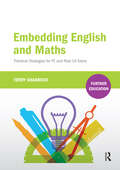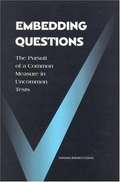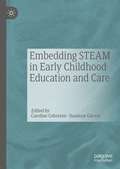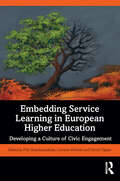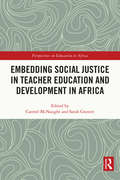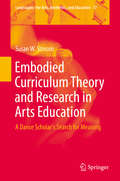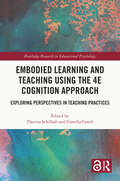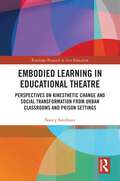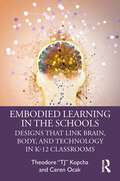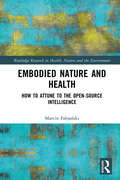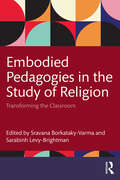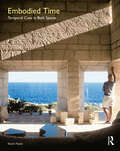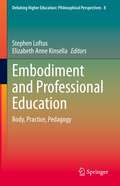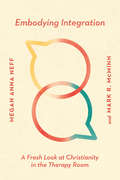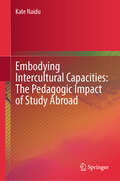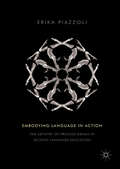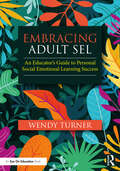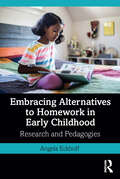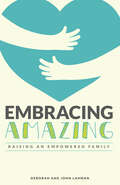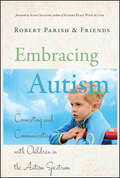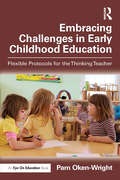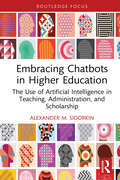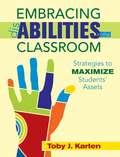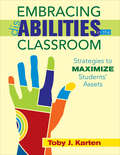- Table View
- List View
Embedding English and Maths: Practical Strategies for FE and Post-16 Tutors (Further Education)
by Terry SharrockFE and other post-16 tutors are increasingly being asked to embed and develop English and maths skills in their lessons, and the revised common inspection framework from Ofsted places an increased emphasis on this. You may lack confidence or the required background knowledge to do this, or be struggling to find ideas that will engage and motivate your learners. Specifically written for use within vocational contexts, this text provides you with a theoretical understanding of the issues involved, including barriers to learning and how to overcome these. In addition it offers a range of practical strategies and ideas to get you started and build confidence and competence in your students. Each activity is accompanied by detailed notes that highlight key learning points, the development of vocational skills and extension opportunities.
Embedding Questions: The Pursuit of a Common Measure in Uncommon Tests
by National Research CouncilInformation on The Pursuit of a Common Measure in Uncommon Tests
Embedding STEAM in Early Childhood Education and Care
by Susanne Garvis Caroline CohrssenThis book approaches STEAM (Science, Technology, Engineering, the Arts and Mathematics) in early childhood education from multiple angles. It focuses on the teaching and learning of children from two years of age to the early years of school. Proponents of STEAM describe how it can create opportunities for children to learn creatively, and various chapter authors make strong connections between discipline areas within the context of an informal curriculum. Others advocate for an integrated STEM, rather than STEAM, approach. With a light touch on theory and a focus on how to embed STE(A)M in an integrated early childhood curriculum, the editors and contributors examine the STEAM versus STEM question from multiple angles. The chapters provide helpful frameworks for parents, teachers and higher education institutions, and make practical suggestions of ways to support young children’s inquiry learning. Drawing on pedagogy and research from around the world, this book will be of interest to scholars of STEAM education, early childhood educators, students of early childhood education and parents of young children.
Embedding Service Learning in European Higher Education: Developing a Culture of Civic Engagement
by Pilar Aramburuzabala Lorraine McIlrath Héctor OpazoService learning brings together students, academics and the community whereby all become teaching resources, problem solvers and partners. In addition to enhancing academic and real-world learning, the overall purpose of service learning is to instil in students a sense of civic engagement and responsibility and work towards positive social change within society. Embedding Service Learning in European Higher Education promotes service learning as a pedagogical approach that develops civic engagement within higher education. It both describes and assesses the most recent developments and contextual positioning of service learning in European higher education and considers if and how the pedagogy is responding to European Union policy and the strategy of higher education institutions and towards engagement with broader societal issues. With case studies from 12 universities across Europe, this book draws on existing practice, shares knowledge and develops best practice to provide conceptual and practical tools for teaching, researching and practising service learning. This book: exposes service learning as a key approach in terms of embedding a culture of political and civic literacy within higher education; considers service learning in Europe, an area of growing research in service learning practice; explores the issue of university social responsibility; presents chapters from leaders in the service learning movement at a national and international level. Practical and engaging, Embedding Service Learning in European Higher Education is a fascinating read for anyone working in service learning as well as those working at universities with an interest in social and civic engagement and institutional reform.
Embedding Social Justice in Teacher Education and Development in Africa (Perspectives on Education in Africa)
by Carmel McNaught Sarah GravettThis book explores the plethora of social-justice issues facing teacher education and development in Africa. Using both theoretical and empirical perspectives, it considers the need for teacher education to be transformational and address conventional pedagogy as well as the rights and duties of all citizens. The edited volume focuses on a wide range of relevant aspects, such as decolonization, economic models, environmental concerns, and multilingual and multicultural aspects of education. Evidence-based chapters cover strategies used to support preservice and in-service teachers on how best to tackle issues of social justice through induction activities, pedagogy and discipline content, involving local communities, and the role of technology, including the use of open educational resources. The principles underlying these strategies are being used in the Covid-19 pandemic and will be equally relevant in the post-Covid-19 world. This book will be of great interest for academics, researchers and postgraduate students in the fields of teacher education, African education, educational policy, international education and comparative education.
Embodied Cognition
by Lawrence ShapiroEmbodied cognition often challenges standard cognitive science. In this outstanding introduction, Lawrence Shapiro sets out the central themes and debates surrounding embodied cognition, explaining and assessing the work of many of the key figures in the field, including George Lakoff, Alva Noe, Andy Clark, and Arthur Glenberg. Beginning with an outline of the theoretical and methodological commitments of standard cognitive science, Shapiro then examines philosophical and empirical arguments surrounding the traditional perspective. He introduces topics such as dynamic systems theory, ecological psychology, robotics, and connectionism, before addressing core issues in philosophy of mind such as mental representation and extended cognition. Including helpful chapter summaries and annotated further reading at the end of each chapter, Embodied Cognition is essential reading for all students of philosophy of mind, psychology, and cognitive science. "
Embodied Curriculum Theory and Research in Arts Education
by Susan W. StinsonThis collection of articles by Susan W. Stinson, organized thematically and chronologically by the author, reveals the evolution of the field of arts education in general and dance education in particular, through narrative and critical reflections by this unique scholar and a few co-authors. It also includes contextual insights not available elsewhere. The author's pioneering embodied research work in arts and dance education continues to be relevant to researchers today. The selected chapters and articles were predominantly previously published in a variety of journals, conference proceedings and books between 1985 and the present. Each section is preceded by an introduction and the author has written a post scriptum for each article to offer a commentary or response to the article from the current perspective.
Embodied Learning and Teaching using the 4E Cognition Approach: Exploring Perspectives in Teaching Practices (Routledge Research in Educational Psychology)
by Theresa Schilhab Camilla GrothThis book operationalises the new field—EmLearning—that integrates embodiment and grounded cognition perspectives with education using the 4E approach as a guiding principle, which suggests that cognition is embodied, embedded, enacted, or extended.Chapters highlight empirical data, providing readers with research-based insight into the theoretical foundations of embodied cognition in learning, illustrated by practical examples. Ultimately, the volume contributes a radical understanding of embodied cognition, demonstrating the importance of the field to the educational system more broadly and suggesting a fundamental change to the way learning, education, and curriculum design are viewed and considered. Based on contemporary scientific findings, the book addresses the educational area with a focus on opening the embodied approach to a wider audience that will circulate the new knowledge and support their educational practices.Written with the purpose of contributing to a broad spectrum of academic educational fields, this book will be of use to postgraduates, researchers, and academics in the fields of higher education, educational psychology, teacher education, and teaching methodology and practice. Teachers and school politicians should also benefit from this volume more broadly.
Embodied Learning in Educational Theatre: Perspectives on Kinesthetic Change and Social Transformation from Urban Classrooms and Prison Settings (Routledge Research in Arts Education)
by Nancy SmithnerThis book explores embodied teaching practices through applied and physical theatre, drawing extensively on the author’s rich experience teaching in diverse urban environments, including schools, colleges and prison settings.It presents a groundbreaking conceptualization of embodied practice aimed at fostering personal and social growth through educational theatre. Each chapter delves into theories of social transformation, supported by qualitative data from student reflections, to provide both theoretical and practical insights. These insights illustrate how physicalized pedagogy can be effectively used to engage students with socially transformative ideas and identities. It also emphasizes the significant role of the facilitator in this process, highlighting how they can create an environment that fosters ethical and multicultural awareness in both formal educational settings, such as classrooms, and informal settings, like community workshops. By promoting an ethos of inclusivity and ethical consideration, it argues that facilitators can help students navigate and engage with complex social issues through the medium of theatre.An accessible and compelling text, it aims to inspire educators to adopt innovative methods that promote deeper engagement and understanding among students.
Embodied Learning in the Schools: Designs That Link Brain, Body, and Technology in K-12 Classrooms
by Theodore “TJ” Kopcha Ceren OcakEmbodied Learning in the Schools explores the relevance of embodied perspectives to instructional designers and education scholars seeking to improve the design, development, and analysis of technology-enhanced learning environments in K-12 settings. Given recent technological advances in touch-based, geolocational, and body integrative devices, there is considerable opportunity to leverage embodied perspectives of cognition to enrich learning in schools today. Grounded in research and theory, this book provides a holistic understanding of embodied cognition’s powerful multidisciplinary applications. Using vivid examples from authentic classrooms, each chapter connects varied theoretical insights to their practical implications for linking brain, body, and technology in learning. Instructional designers, learning scientists, educational technologists, and other scholars and professionals will come away with a comprehensive grasp on the affordances, challenges, frameworks, and embodied designs that can be implemented in real-world contexts across subject areas.
Embodied Nature and Health: How to Attune to the Open-source Intelligence (Routledge Research in Health, Nature and the Environment)
by Marcin FabjańskiThis book describes how, as a species our survival and capacity to flourish depends on realizing the intimate relationship of humans with nature through active, embodied participation with nature. Living within the physicality of the planet is not a limitation, rather it is our liberation. Full realization of the consequences of this relationship, through embodied action, can liberate us from ego-dependence and transform us into a community of interdependent and flourishing beings. Embodied Nature and Health: How to Attune to the Open-source Intelligence describes a systems analysis of presence-centered cultivation of well-being through particular ways of being physically and mentally active in relation to nature that aims at helping the individual attune to natures’ rhythms. The systems analysis proposes the hypothesis of the Open-source Intelligence: an intelligence which originates from the placement of individual organisms in the tissue and the process of life. This framework draws upon and integrates contemporary research into the human–nature relationship and human well-being, and ancient philosophies that were developed prior to the Cartesian gap between the mind and the body, as well as using an auto-ethnographic approach dervied from the experience of the author. The proposed system highlights a practical approach to well-being, based on research into human attention and its effective usage in daily life. The book outlines a methodology that can be used in schools, as a basis of training in sports, as well as in the field of self-development, and highlights the necessity to develop a new, non-abusive relationship with the natural environment. This novel, multi-discipline, first-of-its-kind research book will be of strong interest to experts and academics in the fields of physical activity, education, ecology, and philosophy.
Embodied Pedagogies in the Study of Religion: Transforming the Classroom
by Sravana Borkataky-Varma Sarabinh Levy-BrightmanEmbodied Pedagogies in the Study of Religion provides a forum for creative, renowned teachers (professors and instructors) of religion to discuss ways in which they think about the embodied dimension of teaching and learning specific to their areas of expertise and how they have shaped their curriculum to engage and reflect their thinking. The goal of this volume is multiple: It will showcase deeply thoughtful and creative approaches to teaching and learning that will inspire other teachers and vivify the teaching and academic study of religion. It will raise complex epistemological and ontological issues that underpin the craft of teaching but are rarely discussed and even more rarely discussed with sophistication and about the craft itself. It will raise these issues in relation to multiple traditions that hold different and at times conflicting epistemologies and ontologies, thus opening a truly cross-cultural comparative dialogue. This cutting-edge volume is an open-ended conversation that embraces the exploration of different pedagogies with different kinds of content and quests for different forms of learning and understanding. Ultimately this volume will contribute to a developing conversation in religious studies that moves beyond rigid orthodoxies to a place of open creative, productive, and enacted exploration, cultivation, and theorization.
Embodied Time: Temporal Cues in Built Spaces
by Kevin NuteThe word time occurs more than seven times as often as space in written English, yet in the design of the indoor environments where we now spend most of our lives these priorities are typically reversed, with time often being little more than an afterthought. Embodied Time endeavors to correct that imbalance by demonstrating how built environments can be designed to evoke positive recollections of the past, interactions with the present, and anticipations of the future.
Embodiment and Professional Education: Body, Practice, Pedagogy (Debating Higher Education: Philosophical Perspectives #8)
by Stephen Loftus Elizabeth Anne KinsellaThis book draws attention to the ways in which an awareness of, and sensitivity to, embodiment can enlighten educational practices. It explores discourses from a range of thinkers, including Merleau-Ponty, Gadamer, Bakhtin, Haraway and Ahmed to name a few. The book argues that attention to embodiment can help us to reimagine the goals of education in ways that fit more coherently with human concerns and that offer the chance to provide education that is more holistic and grounded in our corporeality. Theories of embodiment can be used to modify education at the level of curriculum and at the level of pedagogy. This can help us design educational interventions that fit more naturally with how humans are inclined to learn and thus make educational experiences more meaningful. Attention to embodiment allows us to appreciate the extent to which the body appropriates a professional practice and the extent to which a professional practice appropriates the body of the learner. It shows how greater sensitivity to the body can enliven and enlighten our educational practices, especially in professional education.
Embodying Integration: A Fresh Look at Christianity in the Therapy Room (Christian Association for Psychological Studies Books)
by Megan Anna Neff Mark R. McMinnDiscussing spirituality and religion in the therapy room is increasingly accepted, some even forgetting that integration of psychology and Christianity was once a rare thing.Embodying Integration
Embodying Intercultural Capacities: The Pedagogic Impact of Study Abroad
by Kate NaiduThis book examines the extent to which in-country education contributes to the development of intercultural capacities among students and investigates how this occurs. It examines the experiences of Australian university students participating in educational programs in Indonesia and critiques and extends notions of interculturality. The potential development of intercultural capacities is explored in relation to four key themes: pedagogy, temporality, home, and culture. The book demonstrates that interculturalisation is not an automatic or guaranteed result of simply being ‘immersed’ in-country, but rather involves an array of pedagogic processes (involving both human and non-human actors). It outlines the temporal dimensions of in-country education, examining the experience as part of a broader trajectory, involving significant moments, and a range of engagements with diverse temporal rhythms. The book concludes by exploring how students’ understandings of ‘culture’ and ‘cultural difference’ impact the way in which the study-abroad experience is navigated. Readers will gain a deepened understanding of how intercultural capacities develop, which can be applied to other educational contexts including schools, as well as corporate and not-for-profit settings. Those interested in sociology, particularly Bourdieusian analysis, will also benefit from this empirical application (and extension) of the notion of habitus in the context of student mobility. “This is a well conceptualized and beautifully written book that explores how study abroad programs can play an important role in equipping young people to navigate the super-diversity that has now become a critical feature of societies around the world. It shows how such programs have the potential to enhance intercultural capacities, especially when crafted in ways that are thoughtfully fashioned and carefully enacted.” — Fazal Rizvi, University of Melbourne Australia
Embodying Language in Action: The Artistry of Process Drama in Second Language Education
by Erika PiazzoliThis book explores embodiment in second language education, sociocultural theory and research. It focuses on process drama, an embodied approach that engages learners’ imagination, body and voice to create a felt-experience of the second language and culture. Divided into three parts, it begins by examining the aesthetic and intercultural dimension of performative language teaching, the elements of drama and knowing-in-action. The central part of the book examines issues related to play, emotions, classroom discourse and assessment when learning a language through process drama, in a sociocultural perspective. The third part is an analysis of the author’s qualitative research, which informs a subtle discussion on reflective practitioner methodology, learner engagement and teacher artistry. Each chapter includes a drama workshop, illustrating in practice what embodying language in action can look like when working with asylum seekers, adult learners with intellectual disabilities, pre-service teachers, international students and children involved in a Content and Language Integrated Learning (CLIL) programme. A unique combination of theory, research and reflective practice, this book provides valuable insights for teacher/artists, teacher educators and researchers in the fields of performative and sociocultural language learning.
Embracing Adult SEL: An Educator's Guide to Personal Social Emotional Learning Success
by Wendy TurnerSocial emotional learning (SEL) is frequently taught in schools, but how can educators embrace it in their own lives? In this helpful guidebook, Wendy Turner demonstrates the importance of SEL being embraced, understood, and modeled by all members of the learning community. First, she offers tools to increase your self-awareness, including mindset, identity and culture, strengths, and core values. Second, she shows what self-management is and why it matters in helping everyone manage complex emotions in myriad ways. Then she explains what empathy is, and is not, and how it pertains to social issues, identity, and culture. Next, she discusses relationships—how we can foster successful relationships with everyday tools to ignite and support positive connections. Finally, she shows how to synthesize our skills, improving decision-making and modeling this for our students. Throughout each chapter, she provides creative, easy-to-implement ideas, stories, and reflection questions so you can make the ideas your own, enabling you to authentically grow and thrive on your personal and professional path.
Embracing Alternatives to Homework in Early Childhood: Research and Pedagogies
by Angela EckhoffProviding readers with a robust, practical understanding of how young children build knowledge, this book offers a critical examination of the ways traditional homework fails young children, and how alternatives can better build collaborative engagement with families while supporting learning across all content areas. Grounded in culturally sustaining practices, the first section breaks down the pedagogies that support deep learning, while later chapters emphasize the role of critical and creative thinking, project-based learning, and student choice in the development of engaging, personally relevant home learning experiences. Embracing Alternatives to Homework in Early Childhood is a critical text for anyone seeking to reimagine homework practices as both equitable and agency-building in PreK-3.
Embracing Amazing: Consciously Growing an Empowered Family
by Deborah Plunkett Lahman John Lahman“Parenting is hard . . . the reality of parenting is that it is really hard. And let’s be honest, if we’re a parent, we do hard things. Creating a family is much more difficult than others seem to view it.” There is an easy solution for so many things these days. Issues with your car? Buy a new one! Issues with your job? Quit and get a new one! Issues with your phone? Change carriers! Raising a family brings with it issues. Issues that aren’t easily solved like the ones above. Raising a family of five was tough. We had ups and downs like any other family. However there were tools, strategies and lots of communication that enabled us to launch all three of our children into educational entrepreneurs just like us. We wanted to write this book as a way for your family to work through issues, questions and the growth of your children. The biggest lie that parents can believe is that they are all alone in the journey of empowering a family. We don’t want you to believe that so we encourage you to grow through learning, navigate through brokenness, empower resilience and embrace the village. Embracing Amazing highlights the author's fifty years of school counseling experience to help you with all the “HARD” that is coming your way as a parent. John and Deborah Lahman didn’t believe the lie that they were alone and neither should you. This books is a great tool for you regardless of where you are on your parenthood journey.
Embracing Autism
by Susan Senator Robert Parish"The voices here confirm what I've always suspected: everyone is part of one large continuum, and the approaches and insights recounted here can help any parent, any educator, any person deal with any child--or, for that matter, any other person--more effectively and with more compassion. I only wish I'd encountered earlier this cadre of experienced and caring individuals whose humor and resourcefulness represent clearly how best to love and nurture a child."--Cynthia Nitz Ris, J.D., Ph.D., University of CincinnatiThrough sensitive, sometimes humorous, experienced-based writing from teachers, clinicians, and parent activists in the Autism Spectrum Disorder (ASD) community, this book will help educators and others to better understand the world inhabited by ASD children. The stories contained in the book will inspire and inform readers who are working day-to-day with children in the autism spectrum, providing valuable insights into what makes these kids tick and useful information on how they communicate, learn, and succeed.Robert Parish (Cincinnati, OH) is an award-winning journalist with four nationally broadcast public TV documentaries about Autism Spectrum Disorders to his credit, as well as more than 100 digital video projects about ASD for the educational market.
Embracing Challenges in Early Childhood Education: Flexible Protocols for the Thinking Teacher
by Pam Oken-WrightEmbracing Challenges in Early Childhood Education is a key resource for early childhood educators, especially those inspired by the Reggio Emilia approach or other inquiry-based, social-constructivist models. It answers the important question teachers face when they come up against challenges in their work with children: “What do I do now?” Not a how-to guide for implementing the Reggio Emilia philosophy, nor simply an inspirational read, this book encourages reflection, innovation, and responsive teaching while offering practical insights, thoughtful frameworks, and real-world guidance to help educators navigate inevitable challenges in ways that honor their creativity and intelligence along with that of the children in their care. This book is essential reading for early childhood educators, pedagogical consultants, and school leaders and is also a valuable theoretical resource for Reggio-inspired study groups committed to enhancing their educational practices.
Embracing Chatbots in Higher Education: The Use of Artificial Intelligence in Teaching, Administration, and Scholarship (Routledge Research in Digital Education and Educational Technology)
by Alexander M. SidorkinThis book explores the integration of AI-powered chatbots such as ChatGPT into higher education for instructional and communication purposes. The author emphasizes the responsibility of higher education institutions to equip students with advanced skills for writing with AI assistance, and prepare them for an increasingly AI-driven world.Offering numerous practical tips, the book demonstrates how universities can increase student success, and stem the rising cost of higher education by employing AI tools. The chapters discuss streamlining tasks such as grading, providing feedback, and handling administrative duties, to show how educators can be enabled to focus on more meaningful aspects of their work. The author also reflects on the philosophical and ethical considerations and potential pitfalls of relying on AI in higher education, including concerns about academic integrity and the importance of human input in the learning process. The author offers a responsible and informed approach to incorporating the new powerful tools into the academic landscape.This volume will be a key resource for higher education faculty and administrators seeking to navigate the complex intersection of AI and writing.
Embracing Disabilities in the Classroom: Strategies to Maximize Students? Assets
by Toby KartenHow we treat others often influences how individuals feel about themselves. This book illustrates how educators can effectively promote sensitive, inclusive classroom practices that maximize success for students with disabilities. Embracing Disabilities in the Classroom provides content-rich interdisciplinary lessons accompanied by behavioral, academic, and social interventions that capitalize on student strengths. Inclusion expert Toby J. Karten demonstrates the impact of literature, self-advocacy, role playing, and strategic interventions on students' growth and achievement. The numerous lessons, tables, rubrics, instructional guidelines, and charts help readers: * Determine effective strategies for differentiating instruction for specific disabilities * Modify lessons and curriculum appropriately in the content areas * Encourage students to become active participants in learning * Increase disability awareness and foster inclusive mind-sets in students, colleagues, and families This practical resource provides special education and general education teachers, principals, and teacher leaders with both effective instructional strategies for curriculum delivery and responsive approaches to promoting positive attitudes toward disabilities. Given appropriate support and an accepting environment, all students are able to achieve, thrive, and succeed in school and in life!
Embracing Disabilities in the Classroom: Strategies to Maximize Students’ Assets
by Toby J. KartenFoster positive experiences by differentiating not only instruction but attitudes too! This practical resource illustrates how educators can effectively promote sensitive, inclusive practices that maximize success for students with disabilities. Karten demonstrates the impact of literature, self-advocacy, role playing, and behavioral, academic, and social interventions on students’ growth. The numerous tables, rubrics, instructional guidelines, charts, and content-rich interdisciplinary lessons help readers: - Determine effective strategies for differentiating instruction for specific disabilities - Modify lessons and curriculum appropriately in the content areas - Encourage students to become active participants in learning - Increase disability awareness and foster inclusive mind-sets in students, colleagues, and families
